Law of Business Enterprises: Detailed Analysis of Exam 1 & 2
VerifiedAdded on 2023/01/16
|12
|3944
|39
Homework Assignment
AI Summary
This assignment provides comprehensive solutions and analysis for two Business Law exams. Exam 1 covers topics such as directors' duties under the Companies Act 2006, including issues of conflict of interest and fiduciary duty, with reference to case law like Regal Hastings v Gulliver and Re City Equitable Fire Insurance Co. The assignment delves into the consequences of directors' breaches and disqualification. Exam 2 addresses insolvency, including the application of the Insolvency Act 1986 and wrongful and fraudulent trading. It examines the role of liquidators and legal solutions. Furthermore, it analyzes the validity of partnership agreements, supported by the case study of Hurst V. Bryk. The solutions also include the statutory contract under section 33 of the companies act, 2006.
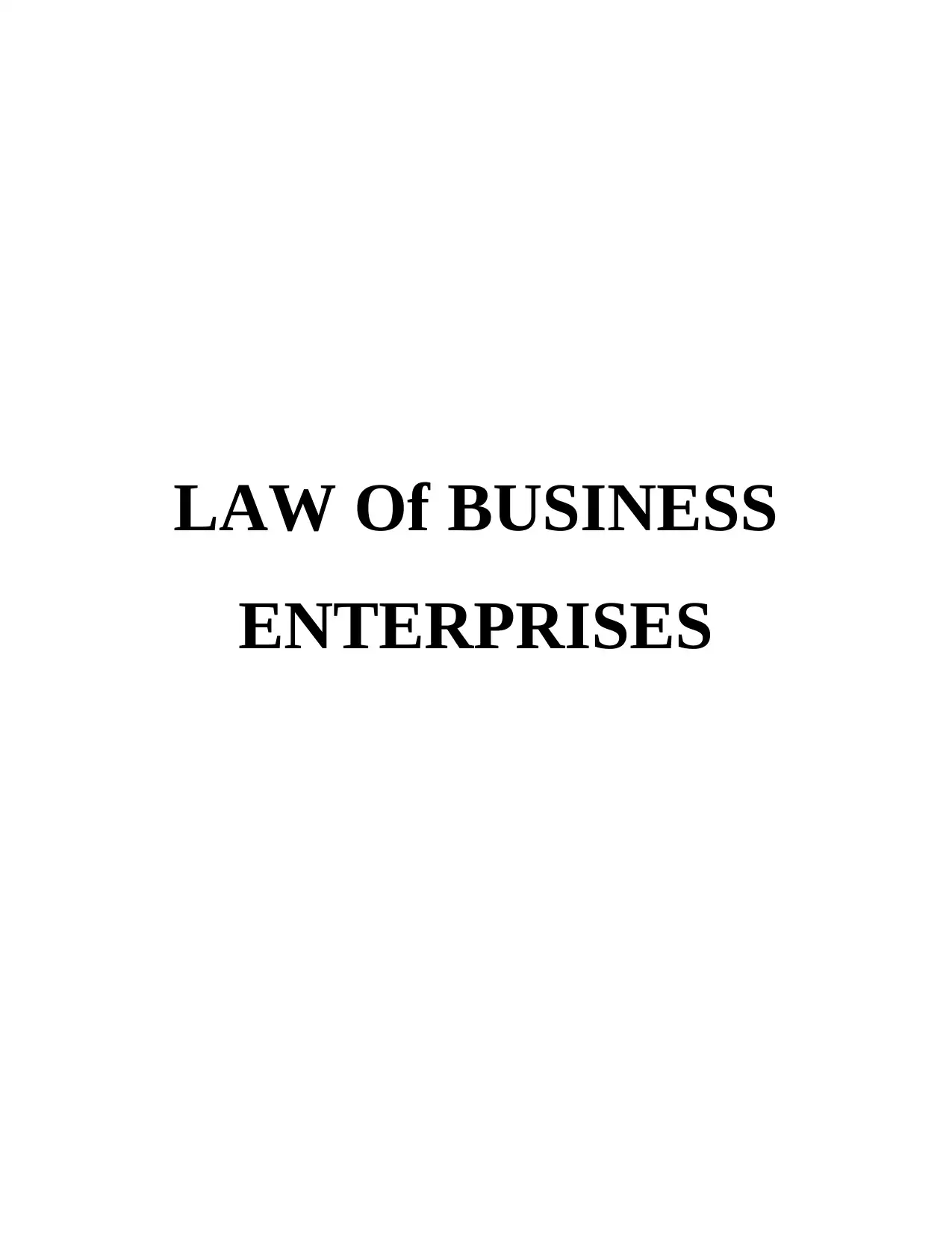
LAW Of BUSINESS
ENTERPRISES
ENTERPRISES
Paraphrase This Document
Need a fresh take? Get an instant paraphrase of this document with our AI Paraphraser
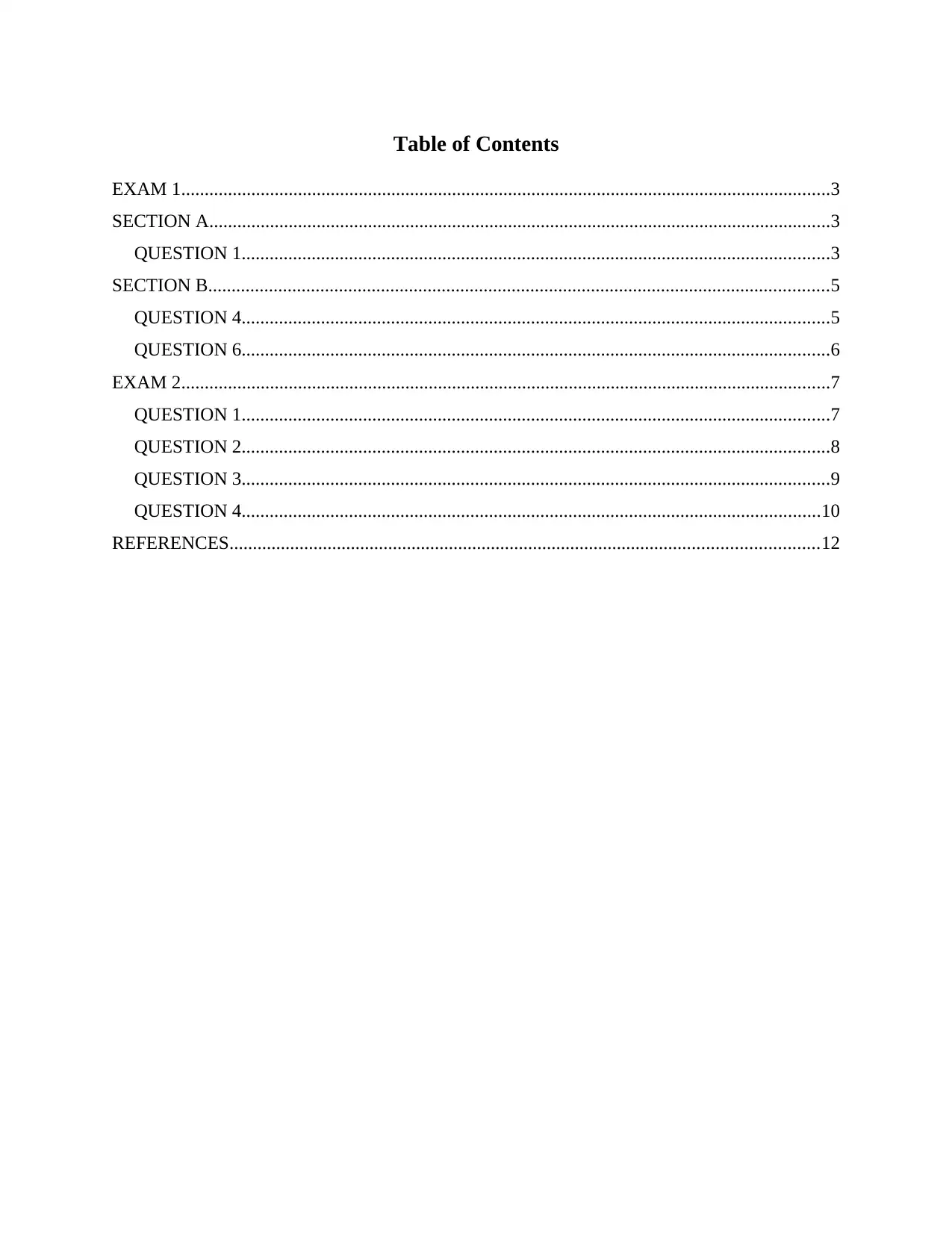
Table of Contents
EXAM 1...........................................................................................................................................3
SECTION A.....................................................................................................................................3
QUESTION 1..............................................................................................................................3
SECTION B.....................................................................................................................................5
QUESTION 4..............................................................................................................................5
QUESTION 6..............................................................................................................................6
EXAM 2...........................................................................................................................................7
QUESTION 1..............................................................................................................................7
QUESTION 2..............................................................................................................................8
QUESTION 3..............................................................................................................................9
QUESTION 4............................................................................................................................10
REFERENCES..............................................................................................................................12
EXAM 1...........................................................................................................................................3
SECTION A.....................................................................................................................................3
QUESTION 1..............................................................................................................................3
SECTION B.....................................................................................................................................5
QUESTION 4..............................................................................................................................5
QUESTION 6..............................................................................................................................6
EXAM 2...........................................................................................................................................7
QUESTION 1..............................................................................................................................7
QUESTION 2..............................................................................................................................8
QUESTION 3..............................................................................................................................9
QUESTION 4............................................................................................................................10
REFERENCES..............................................................................................................................12
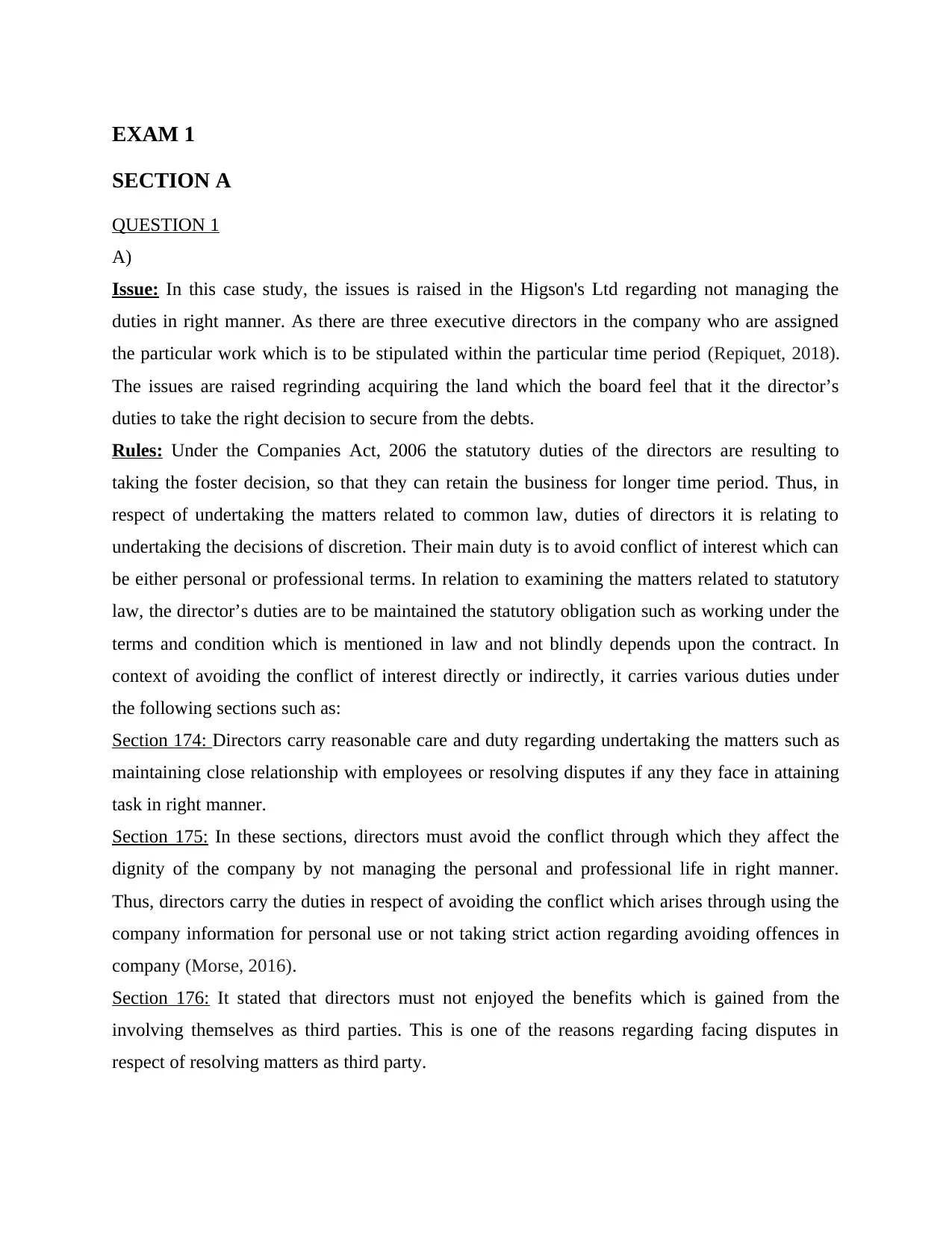
EXAM 1
SECTION A
QUESTION 1
A)
Issue: In this case study, the issues is raised in the Higson's Ltd regarding not managing the
duties in right manner. As there are three executive directors in the company who are assigned
the particular work which is to be stipulated within the particular time period (Repiquet, 2018).
The issues are raised regrinding acquiring the land which the board feel that it the director’s
duties to take the right decision to secure from the debts.
Rules: Under the Companies Act, 2006 the statutory duties of the directors are resulting to
taking the foster decision, so that they can retain the business for longer time period. Thus, in
respect of undertaking the matters related to common law, duties of directors it is relating to
undertaking the decisions of discretion. Their main duty is to avoid conflict of interest which can
be either personal or professional terms. In relation to examining the matters related to statutory
law, the director’s duties are to be maintained the statutory obligation such as working under the
terms and condition which is mentioned in law and not blindly depends upon the contract. In
context of avoiding the conflict of interest directly or indirectly, it carries various duties under
the following sections such as:
Section 174: Directors carry reasonable care and duty regarding undertaking the matters such as
maintaining close relationship with employees or resolving disputes if any they face in attaining
task in right manner.
Section 175: In these sections, directors must avoid the conflict through which they affect the
dignity of the company by not managing the personal and professional life in right manner.
Thus, directors carry the duties in respect of avoiding the conflict which arises through using the
company information for personal use or not taking strict action regarding avoiding offences in
company (Morse, 2016).
Section 176: It stated that directors must not enjoyed the benefits which is gained from the
involving themselves as third parties. This is one of the reasons regarding facing disputes in
respect of resolving matters as third party.
SECTION A
QUESTION 1
A)
Issue: In this case study, the issues is raised in the Higson's Ltd regarding not managing the
duties in right manner. As there are three executive directors in the company who are assigned
the particular work which is to be stipulated within the particular time period (Repiquet, 2018).
The issues are raised regrinding acquiring the land which the board feel that it the director’s
duties to take the right decision to secure from the debts.
Rules: Under the Companies Act, 2006 the statutory duties of the directors are resulting to
taking the foster decision, so that they can retain the business for longer time period. Thus, in
respect of undertaking the matters related to common law, duties of directors it is relating to
undertaking the decisions of discretion. Their main duty is to avoid conflict of interest which can
be either personal or professional terms. In relation to examining the matters related to statutory
law, the director’s duties are to be maintained the statutory obligation such as working under the
terms and condition which is mentioned in law and not blindly depends upon the contract. In
context of avoiding the conflict of interest directly or indirectly, it carries various duties under
the following sections such as:
Section 174: Directors carry reasonable care and duty regarding undertaking the matters such as
maintaining close relationship with employees or resolving disputes if any they face in attaining
task in right manner.
Section 175: In these sections, directors must avoid the conflict through which they affect the
dignity of the company by not managing the personal and professional life in right manner.
Thus, directors carry the duties in respect of avoiding the conflict which arises through using the
company information for personal use or not taking strict action regarding avoiding offences in
company (Morse, 2016).
Section 176: It stated that directors must not enjoyed the benefits which is gained from the
involving themselves as third parties. This is one of the reasons regarding facing disputes in
respect of resolving matters as third party.
⊘ This is a preview!⊘
Do you want full access?
Subscribe today to unlock all pages.

Trusted by 1+ million students worldwide
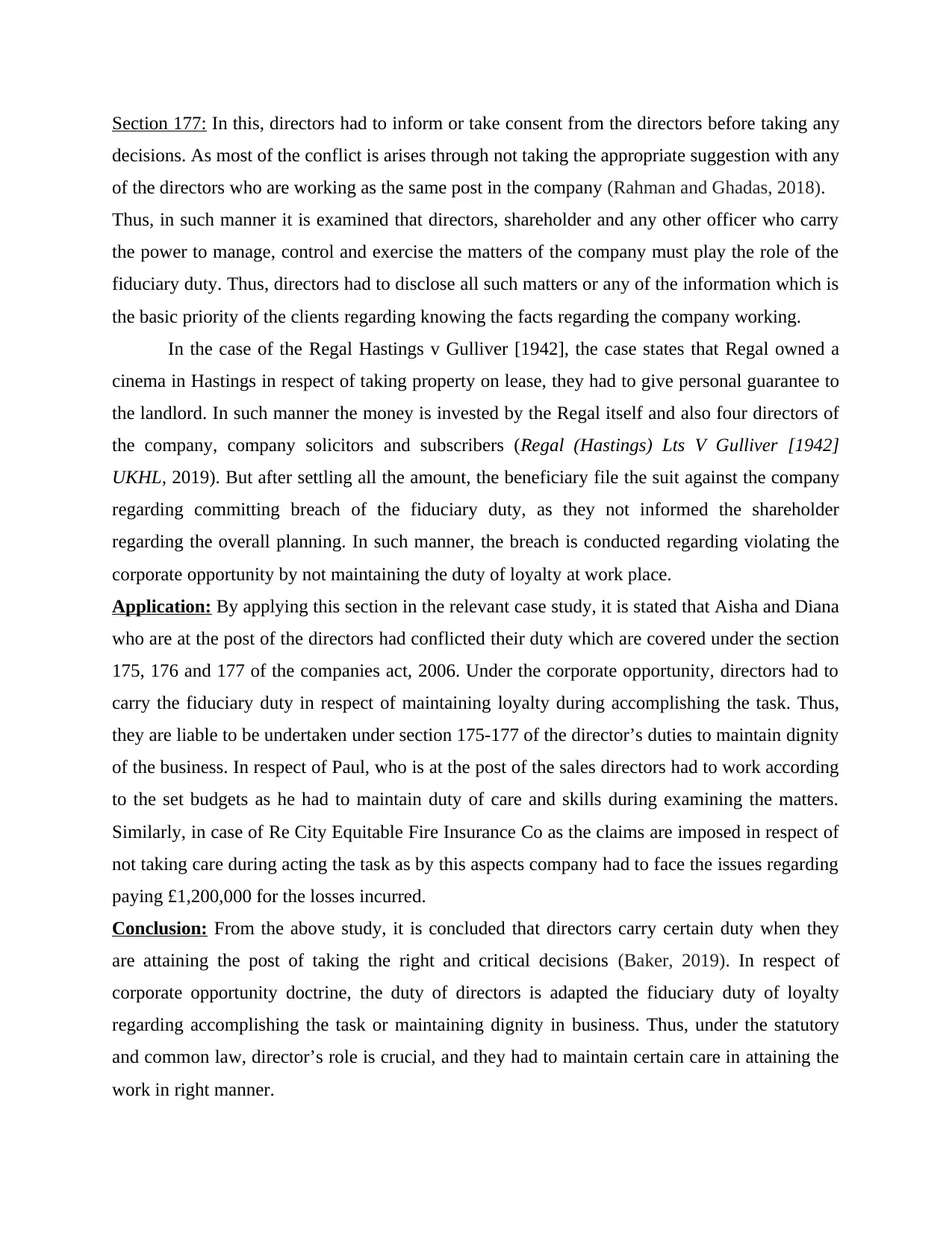
Section 177: In this, directors had to inform or take consent from the directors before taking any
decisions. As most of the conflict is arises through not taking the appropriate suggestion with any
of the directors who are working as the same post in the company (Rahman and Ghadas, 2018).
Thus, in such manner it is examined that directors, shareholder and any other officer who carry
the power to manage, control and exercise the matters of the company must play the role of the
fiduciary duty. Thus, directors had to disclose all such matters or any of the information which is
the basic priority of the clients regarding knowing the facts regarding the company working.
In the case of the Regal Hastings v Gulliver [1942], the case states that Regal owned a
cinema in Hastings in respect of taking property on lease, they had to give personal guarantee to
the landlord. In such manner the money is invested by the Regal itself and also four directors of
the company, company solicitors and subscribers (Regal (Hastings) Lts V Gulliver [1942]
UKHL, 2019). But after settling all the amount, the beneficiary file the suit against the company
regarding committing breach of the fiduciary duty, as they not informed the shareholder
regarding the overall planning. In such manner, the breach is conducted regarding violating the
corporate opportunity by not maintaining the duty of loyalty at work place.
Application: By applying this section in the relevant case study, it is stated that Aisha and Diana
who are at the post of the directors had conflicted their duty which are covered under the section
175, 176 and 177 of the companies act, 2006. Under the corporate opportunity, directors had to
carry the fiduciary duty in respect of maintaining loyalty during accomplishing the task. Thus,
they are liable to be undertaken under section 175-177 of the director’s duties to maintain dignity
of the business. In respect of Paul, who is at the post of the sales directors had to work according
to the set budgets as he had to maintain duty of care and skills during examining the matters.
Similarly, in case of Re City Equitable Fire Insurance Co as the claims are imposed in respect of
not taking care during acting the task as by this aspects company had to face the issues regarding
paying £1,200,000 for the losses incurred.
Conclusion: From the above study, it is concluded that directors carry certain duty when they
are attaining the post of taking the right and critical decisions (Baker, 2019). In respect of
corporate opportunity doctrine, the duty of directors is adapted the fiduciary duty of loyalty
regarding accomplishing the task or maintaining dignity in business. Thus, under the statutory
and common law, director’s role is crucial, and they had to maintain certain care in attaining the
work in right manner.
decisions. As most of the conflict is arises through not taking the appropriate suggestion with any
of the directors who are working as the same post in the company (Rahman and Ghadas, 2018).
Thus, in such manner it is examined that directors, shareholder and any other officer who carry
the power to manage, control and exercise the matters of the company must play the role of the
fiduciary duty. Thus, directors had to disclose all such matters or any of the information which is
the basic priority of the clients regarding knowing the facts regarding the company working.
In the case of the Regal Hastings v Gulliver [1942], the case states that Regal owned a
cinema in Hastings in respect of taking property on lease, they had to give personal guarantee to
the landlord. In such manner the money is invested by the Regal itself and also four directors of
the company, company solicitors and subscribers (Regal (Hastings) Lts V Gulliver [1942]
UKHL, 2019). But after settling all the amount, the beneficiary file the suit against the company
regarding committing breach of the fiduciary duty, as they not informed the shareholder
regarding the overall planning. In such manner, the breach is conducted regarding violating the
corporate opportunity by not maintaining the duty of loyalty at work place.
Application: By applying this section in the relevant case study, it is stated that Aisha and Diana
who are at the post of the directors had conflicted their duty which are covered under the section
175, 176 and 177 of the companies act, 2006. Under the corporate opportunity, directors had to
carry the fiduciary duty in respect of maintaining loyalty during accomplishing the task. Thus,
they are liable to be undertaken under section 175-177 of the director’s duties to maintain dignity
of the business. In respect of Paul, who is at the post of the sales directors had to work according
to the set budgets as he had to maintain duty of care and skills during examining the matters.
Similarly, in case of Re City Equitable Fire Insurance Co as the claims are imposed in respect of
not taking care during acting the task as by this aspects company had to face the issues regarding
paying £1,200,000 for the losses incurred.
Conclusion: From the above study, it is concluded that directors carry certain duty when they
are attaining the post of taking the right and critical decisions (Baker, 2019). In respect of
corporate opportunity doctrine, the duty of directors is adapted the fiduciary duty of loyalty
regarding accomplishing the task or maintaining dignity in business. Thus, under the statutory
and common law, director’s role is crucial, and they had to maintain certain care in attaining the
work in right manner.
Paraphrase This Document
Need a fresh take? Get an instant paraphrase of this document with our AI Paraphraser
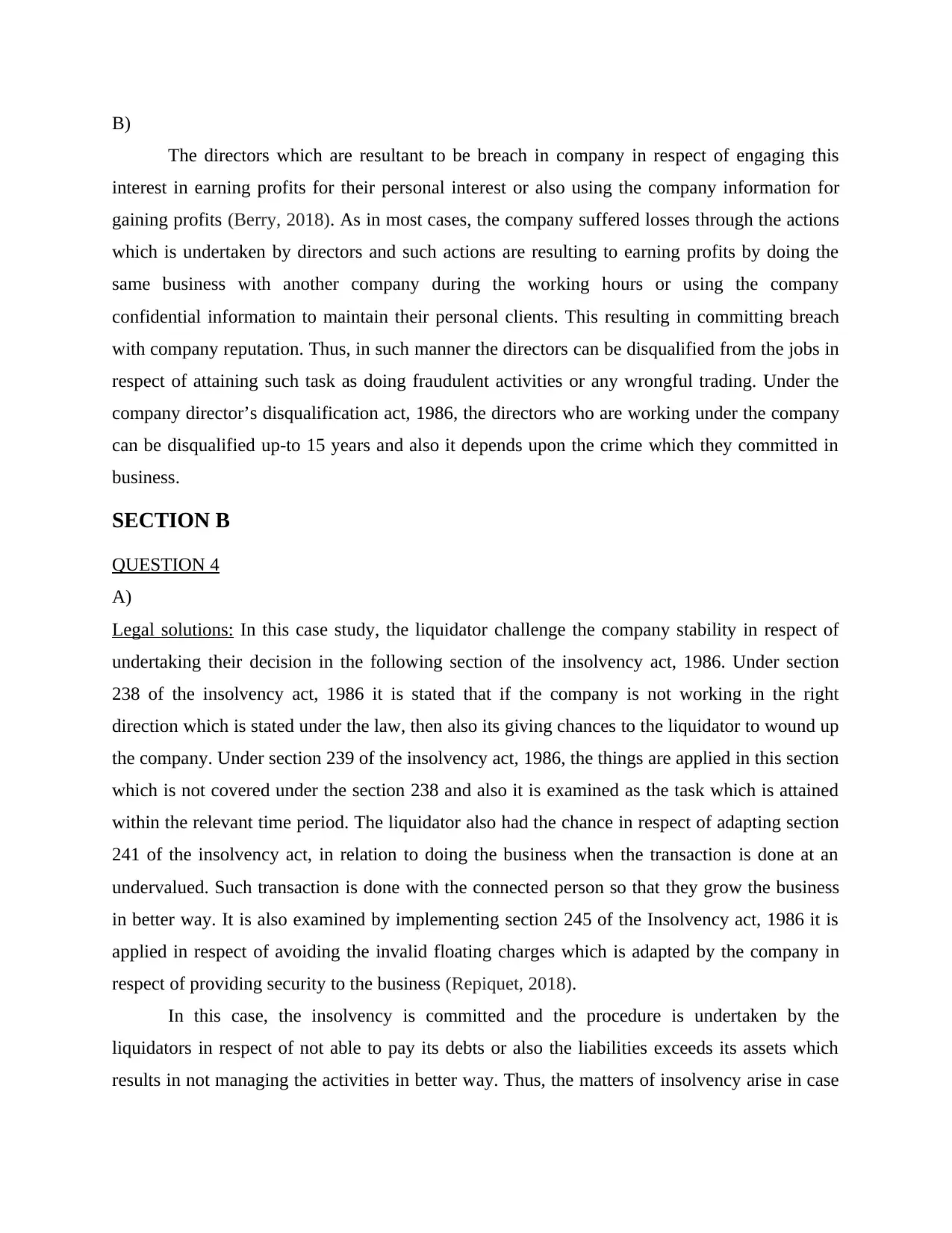
B)
The directors which are resultant to be breach in company in respect of engaging this
interest in earning profits for their personal interest or also using the company information for
gaining profits (Berry, 2018). As in most cases, the company suffered losses through the actions
which is undertaken by directors and such actions are resulting to earning profits by doing the
same business with another company during the working hours or using the company
confidential information to maintain their personal clients. This resulting in committing breach
with company reputation. Thus, in such manner the directors can be disqualified from the jobs in
respect of attaining such task as doing fraudulent activities or any wrongful trading. Under the
company director’s disqualification act, 1986, the directors who are working under the company
can be disqualified up-to 15 years and also it depends upon the crime which they committed in
business.
SECTION B
QUESTION 4
A)
Legal solutions: In this case study, the liquidator challenge the company stability in respect of
undertaking their decision in the following section of the insolvency act, 1986. Under section
238 of the insolvency act, 1986 it is stated that if the company is not working in the right
direction which is stated under the law, then also its giving chances to the liquidator to wound up
the company. Under section 239 of the insolvency act, 1986, the things are applied in this section
which is not covered under the section 238 and also it is examined as the task which is attained
within the relevant time period. The liquidator also had the chance in respect of adapting section
241 of the insolvency act, in relation to doing the business when the transaction is done at an
undervalued. Such transaction is done with the connected person so that they grow the business
in better way. It is also examined by implementing section 245 of the Insolvency act, 1986 it is
applied in respect of avoiding the invalid floating charges which is adapted by the company in
respect of providing security to the business (Repiquet, 2018).
In this case, the insolvency is committed and the procedure is undertaken by the
liquidators in respect of not able to pay its debts or also the liabilities exceeds its assets which
results in not managing the activities in better way. Thus, the matters of insolvency arise in case
The directors which are resultant to be breach in company in respect of engaging this
interest in earning profits for their personal interest or also using the company information for
gaining profits (Berry, 2018). As in most cases, the company suffered losses through the actions
which is undertaken by directors and such actions are resulting to earning profits by doing the
same business with another company during the working hours or using the company
confidential information to maintain their personal clients. This resulting in committing breach
with company reputation. Thus, in such manner the directors can be disqualified from the jobs in
respect of attaining such task as doing fraudulent activities or any wrongful trading. Under the
company director’s disqualification act, 1986, the directors who are working under the company
can be disqualified up-to 15 years and also it depends upon the crime which they committed in
business.
SECTION B
QUESTION 4
A)
Legal solutions: In this case study, the liquidator challenge the company stability in respect of
undertaking their decision in the following section of the insolvency act, 1986. Under section
238 of the insolvency act, 1986 it is stated that if the company is not working in the right
direction which is stated under the law, then also its giving chances to the liquidator to wound up
the company. Under section 239 of the insolvency act, 1986, the things are applied in this section
which is not covered under the section 238 and also it is examined as the task which is attained
within the relevant time period. The liquidator also had the chance in respect of adapting section
241 of the insolvency act, in relation to doing the business when the transaction is done at an
undervalued. Such transaction is done with the connected person so that they grow the business
in better way. It is also examined by implementing section 245 of the Insolvency act, 1986 it is
applied in respect of avoiding the invalid floating charges which is adapted by the company in
respect of providing security to the business (Repiquet, 2018).
In this case, the insolvency is committed and the procedure is undertaken by the
liquidators in respect of not able to pay its debts or also the liabilities exceeds its assets which
results in not managing the activities in better way. Thus, the matters of insolvency arise in case
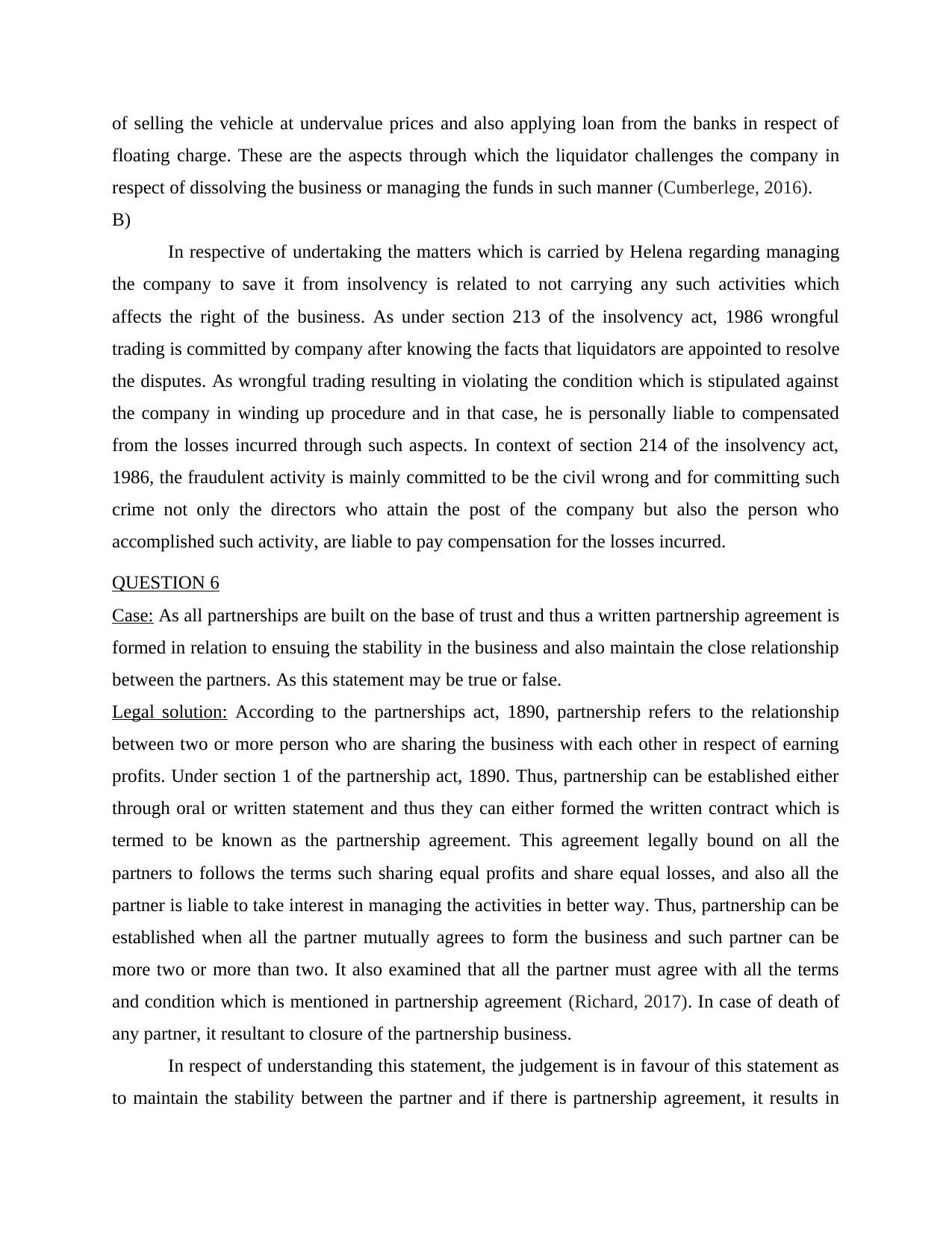
of selling the vehicle at undervalue prices and also applying loan from the banks in respect of
floating charge. These are the aspects through which the liquidator challenges the company in
respect of dissolving the business or managing the funds in such manner (Cumberlege, 2016).
B)
In respective of undertaking the matters which is carried by Helena regarding managing
the company to save it from insolvency is related to not carrying any such activities which
affects the right of the business. As under section 213 of the insolvency act, 1986 wrongful
trading is committed by company after knowing the facts that liquidators are appointed to resolve
the disputes. As wrongful trading resulting in violating the condition which is stipulated against
the company in winding up procedure and in that case, he is personally liable to compensated
from the losses incurred through such aspects. In context of section 214 of the insolvency act,
1986, the fraudulent activity is mainly committed to be the civil wrong and for committing such
crime not only the directors who attain the post of the company but also the person who
accomplished such activity, are liable to pay compensation for the losses incurred.
QUESTION 6
Case: As all partnerships are built on the base of trust and thus a written partnership agreement is
formed in relation to ensuing the stability in the business and also maintain the close relationship
between the partners. As this statement may be true or false.
Legal solution: According to the partnerships act, 1890, partnership refers to the relationship
between two or more person who are sharing the business with each other in respect of earning
profits. Under section 1 of the partnership act, 1890. Thus, partnership can be established either
through oral or written statement and thus they can either formed the written contract which is
termed to be known as the partnership agreement. This agreement legally bound on all the
partners to follows the terms such sharing equal profits and share equal losses, and also all the
partner is liable to take interest in managing the activities in better way. Thus, partnership can be
established when all the partner mutually agrees to form the business and such partner can be
more two or more than two. It also examined that all the partner must agree with all the terms
and condition which is mentioned in partnership agreement (Richard, 2017). In case of death of
any partner, it resultant to closure of the partnership business.
In respect of understanding this statement, the judgement is in favour of this statement as
to maintain the stability between the partner and if there is partnership agreement, it results in
floating charge. These are the aspects through which the liquidator challenges the company in
respect of dissolving the business or managing the funds in such manner (Cumberlege, 2016).
B)
In respective of undertaking the matters which is carried by Helena regarding managing
the company to save it from insolvency is related to not carrying any such activities which
affects the right of the business. As under section 213 of the insolvency act, 1986 wrongful
trading is committed by company after knowing the facts that liquidators are appointed to resolve
the disputes. As wrongful trading resulting in violating the condition which is stipulated against
the company in winding up procedure and in that case, he is personally liable to compensated
from the losses incurred through such aspects. In context of section 214 of the insolvency act,
1986, the fraudulent activity is mainly committed to be the civil wrong and for committing such
crime not only the directors who attain the post of the company but also the person who
accomplished such activity, are liable to pay compensation for the losses incurred.
QUESTION 6
Case: As all partnerships are built on the base of trust and thus a written partnership agreement is
formed in relation to ensuing the stability in the business and also maintain the close relationship
between the partners. As this statement may be true or false.
Legal solution: According to the partnerships act, 1890, partnership refers to the relationship
between two or more person who are sharing the business with each other in respect of earning
profits. Under section 1 of the partnership act, 1890. Thus, partnership can be established either
through oral or written statement and thus they can either formed the written contract which is
termed to be known as the partnership agreement. This agreement legally bound on all the
partners to follows the terms such sharing equal profits and share equal losses, and also all the
partner is liable to take interest in managing the activities in better way. Thus, partnership can be
established when all the partner mutually agrees to form the business and such partner can be
more two or more than two. It also examined that all the partner must agree with all the terms
and condition which is mentioned in partnership agreement (Richard, 2017). In case of death of
any partner, it resultant to closure of the partnership business.
In respect of understanding this statement, the judgement is in favour of this statement as
to maintain the stability between the partner and if there is partnership agreement, it results in
⊘ This is a preview!⊘
Do you want full access?
Subscribe today to unlock all pages.

Trusted by 1+ million students worldwide
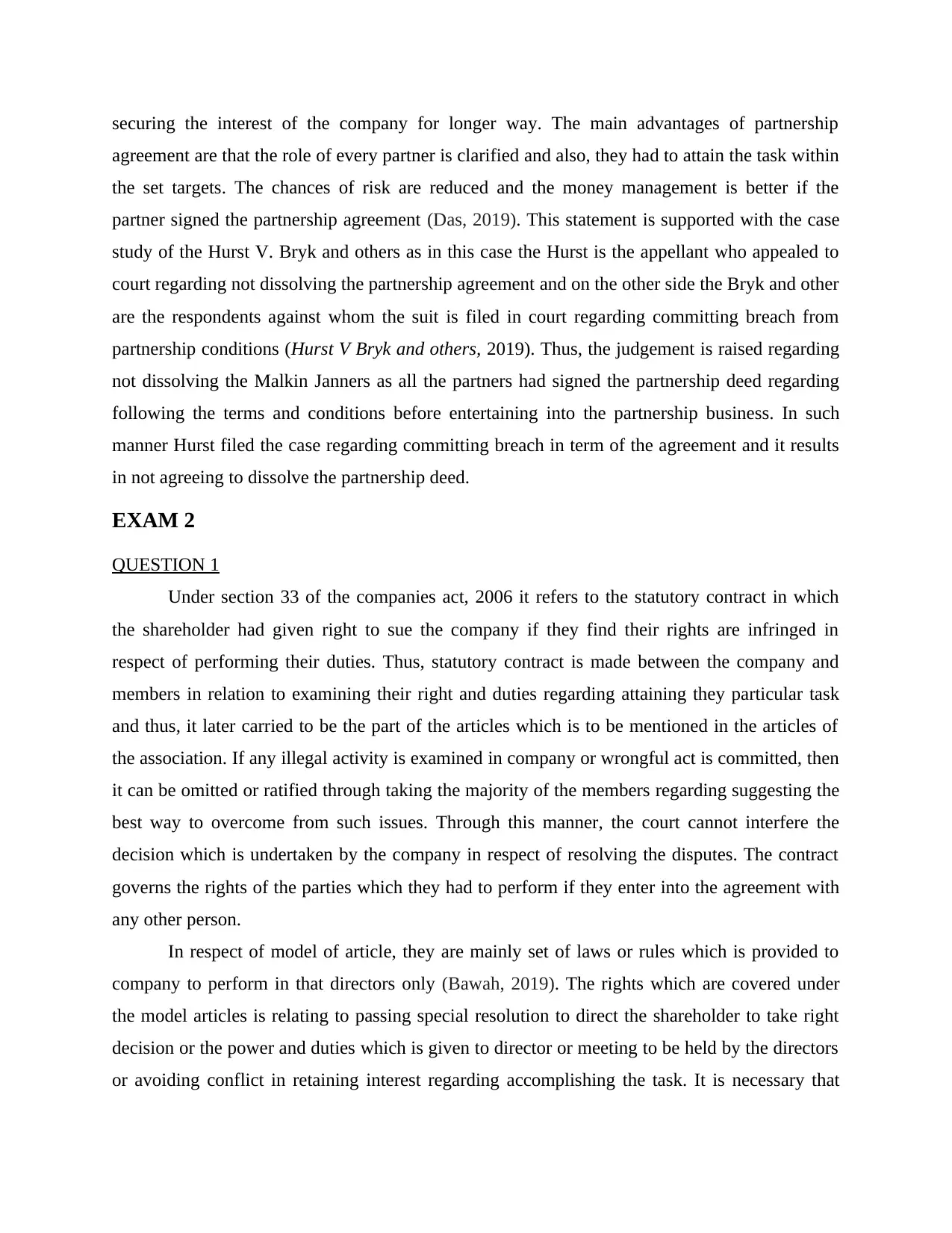
securing the interest of the company for longer way. The main advantages of partnership
agreement are that the role of every partner is clarified and also, they had to attain the task within
the set targets. The chances of risk are reduced and the money management is better if the
partner signed the partnership agreement (Das, 2019). This statement is supported with the case
study of the Hurst V. Bryk and others as in this case the Hurst is the appellant who appealed to
court regarding not dissolving the partnership agreement and on the other side the Bryk and other
are the respondents against whom the suit is filed in court regarding committing breach from
partnership conditions (Hurst V Bryk and others, 2019). Thus, the judgement is raised regarding
not dissolving the Malkin Janners as all the partners had signed the partnership deed regarding
following the terms and conditions before entertaining into the partnership business. In such
manner Hurst filed the case regarding committing breach in term of the agreement and it results
in not agreeing to dissolve the partnership deed.
EXAM 2
QUESTION 1
Under section 33 of the companies act, 2006 it refers to the statutory contract in which
the shareholder had given right to sue the company if they find their rights are infringed in
respect of performing their duties. Thus, statutory contract is made between the company and
members in relation to examining their right and duties regarding attaining they particular task
and thus, it later carried to be the part of the articles which is to be mentioned in the articles of
the association. If any illegal activity is examined in company or wrongful act is committed, then
it can be omitted or ratified through taking the majority of the members regarding suggesting the
best way to overcome from such issues. Through this manner, the court cannot interfere the
decision which is undertaken by the company in respect of resolving the disputes. The contract
governs the rights of the parties which they had to perform if they enter into the agreement with
any other person.
In respect of model of article, they are mainly set of laws or rules which is provided to
company to perform in that directors only (Bawah, 2019). The rights which are covered under
the model articles is relating to passing special resolution to direct the shareholder to take right
decision or the power and duties which is given to director or meeting to be held by the directors
or avoiding conflict in retaining interest regarding accomplishing the task. It is necessary that
agreement are that the role of every partner is clarified and also, they had to attain the task within
the set targets. The chances of risk are reduced and the money management is better if the
partner signed the partnership agreement (Das, 2019). This statement is supported with the case
study of the Hurst V. Bryk and others as in this case the Hurst is the appellant who appealed to
court regarding not dissolving the partnership agreement and on the other side the Bryk and other
are the respondents against whom the suit is filed in court regarding committing breach from
partnership conditions (Hurst V Bryk and others, 2019). Thus, the judgement is raised regarding
not dissolving the Malkin Janners as all the partners had signed the partnership deed regarding
following the terms and conditions before entertaining into the partnership business. In such
manner Hurst filed the case regarding committing breach in term of the agreement and it results
in not agreeing to dissolve the partnership deed.
EXAM 2
QUESTION 1
Under section 33 of the companies act, 2006 it refers to the statutory contract in which
the shareholder had given right to sue the company if they find their rights are infringed in
respect of performing their duties. Thus, statutory contract is made between the company and
members in relation to examining their right and duties regarding attaining they particular task
and thus, it later carried to be the part of the articles which is to be mentioned in the articles of
the association. If any illegal activity is examined in company or wrongful act is committed, then
it can be omitted or ratified through taking the majority of the members regarding suggesting the
best way to overcome from such issues. Through this manner, the court cannot interfere the
decision which is undertaken by the company in respect of resolving the disputes. The contract
governs the rights of the parties which they had to perform if they enter into the agreement with
any other person.
In respect of model of article, they are mainly set of laws or rules which is provided to
company to perform in that directors only (Bawah, 2019). The rights which are covered under
the model articles is relating to passing special resolution to direct the shareholder to take right
decision or the power and duties which is given to director or meeting to be held by the directors
or avoiding conflict in retaining interest regarding accomplishing the task. It is necessary that
Paraphrase This Document
Need a fresh take? Get an instant paraphrase of this document with our AI Paraphraser
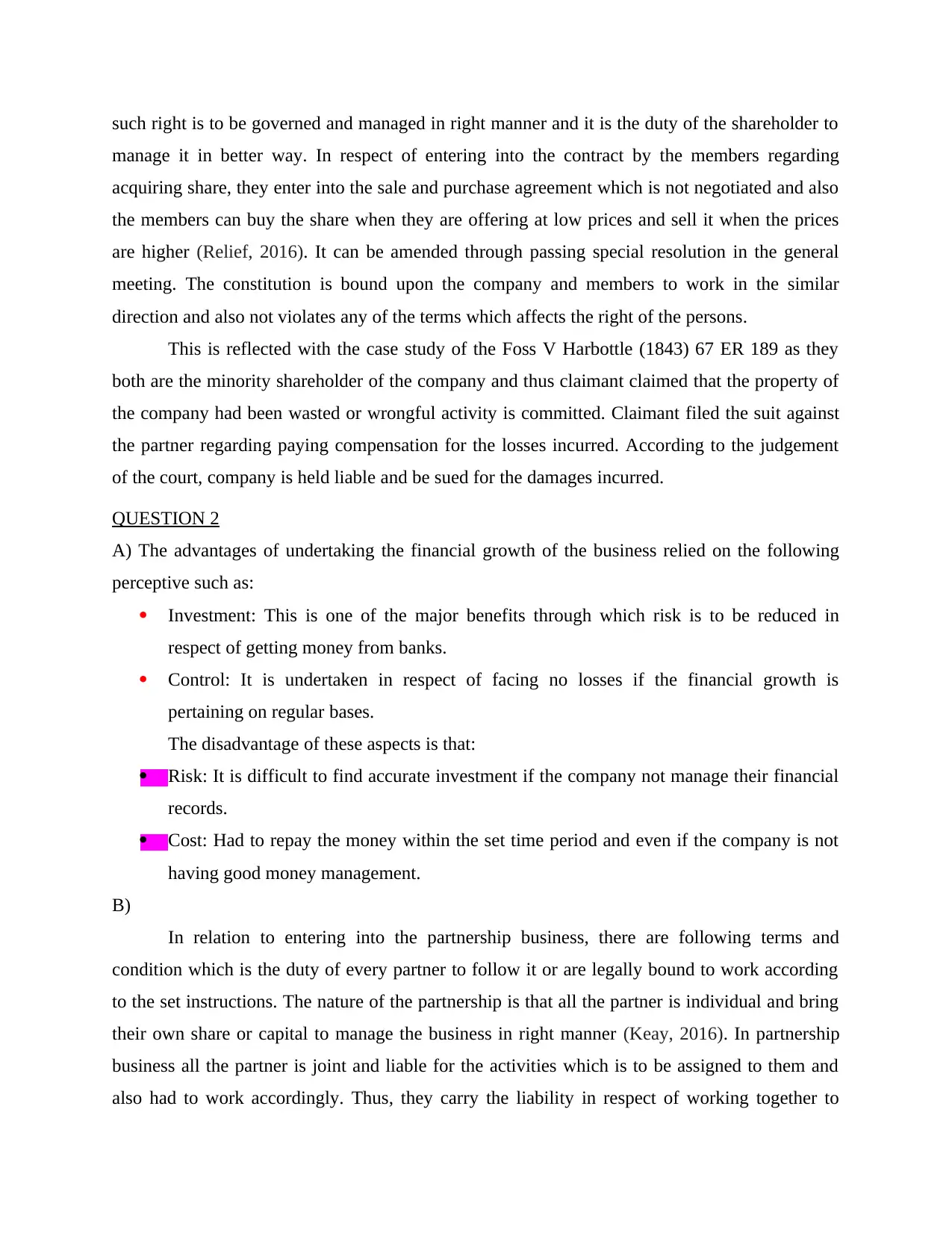
such right is to be governed and managed in right manner and it is the duty of the shareholder to
manage it in better way. In respect of entering into the contract by the members regarding
acquiring share, they enter into the sale and purchase agreement which is not negotiated and also
the members can buy the share when they are offering at low prices and sell it when the prices
are higher (Relief, 2016). It can be amended through passing special resolution in the general
meeting. The constitution is bound upon the company and members to work in the similar
direction and also not violates any of the terms which affects the right of the persons.
This is reflected with the case study of the Foss V Harbottle (1843) 67 ER 189 as they
both are the minority shareholder of the company and thus claimant claimed that the property of
the company had been wasted or wrongful activity is committed. Claimant filed the suit against
the partner regarding paying compensation for the losses incurred. According to the judgement
of the court, company is held liable and be sued for the damages incurred.
QUESTION 2
A) The advantages of undertaking the financial growth of the business relied on the following
perceptive such as:
Investment: This is one of the major benefits through which risk is to be reduced in
respect of getting money from banks.
Control: It is undertaken in respect of facing no losses if the financial growth is
pertaining on regular bases.
The disadvantage of these aspects is that:
Risk: It is difficult to find accurate investment if the company not manage their financial
records.
Cost: Had to repay the money within the set time period and even if the company is not
having good money management.
B)
In relation to entering into the partnership business, there are following terms and
condition which is the duty of every partner to follow it or are legally bound to work according
to the set instructions. The nature of the partnership is that all the partner is individual and bring
their own share or capital to manage the business in right manner (Keay, 2016). In partnership
business all the partner is joint and liable for the activities which is to be assigned to them and
also had to work accordingly. Thus, they carry the liability in respect of working together to
manage it in better way. In respect of entering into the contract by the members regarding
acquiring share, they enter into the sale and purchase agreement which is not negotiated and also
the members can buy the share when they are offering at low prices and sell it when the prices
are higher (Relief, 2016). It can be amended through passing special resolution in the general
meeting. The constitution is bound upon the company and members to work in the similar
direction and also not violates any of the terms which affects the right of the persons.
This is reflected with the case study of the Foss V Harbottle (1843) 67 ER 189 as they
both are the minority shareholder of the company and thus claimant claimed that the property of
the company had been wasted or wrongful activity is committed. Claimant filed the suit against
the partner regarding paying compensation for the losses incurred. According to the judgement
of the court, company is held liable and be sued for the damages incurred.
QUESTION 2
A) The advantages of undertaking the financial growth of the business relied on the following
perceptive such as:
Investment: This is one of the major benefits through which risk is to be reduced in
respect of getting money from banks.
Control: It is undertaken in respect of facing no losses if the financial growth is
pertaining on regular bases.
The disadvantage of these aspects is that:
Risk: It is difficult to find accurate investment if the company not manage their financial
records.
Cost: Had to repay the money within the set time period and even if the company is not
having good money management.
B)
In relation to entering into the partnership business, there are following terms and
condition which is the duty of every partner to follow it or are legally bound to work according
to the set instructions. The nature of the partnership is that all the partner is individual and bring
their own share or capital to manage the business in right manner (Keay, 2016). In partnership
business all the partner is joint and liable for the activities which is to be assigned to them and
also had to work accordingly. Thus, they carry the liability in respect of working together to
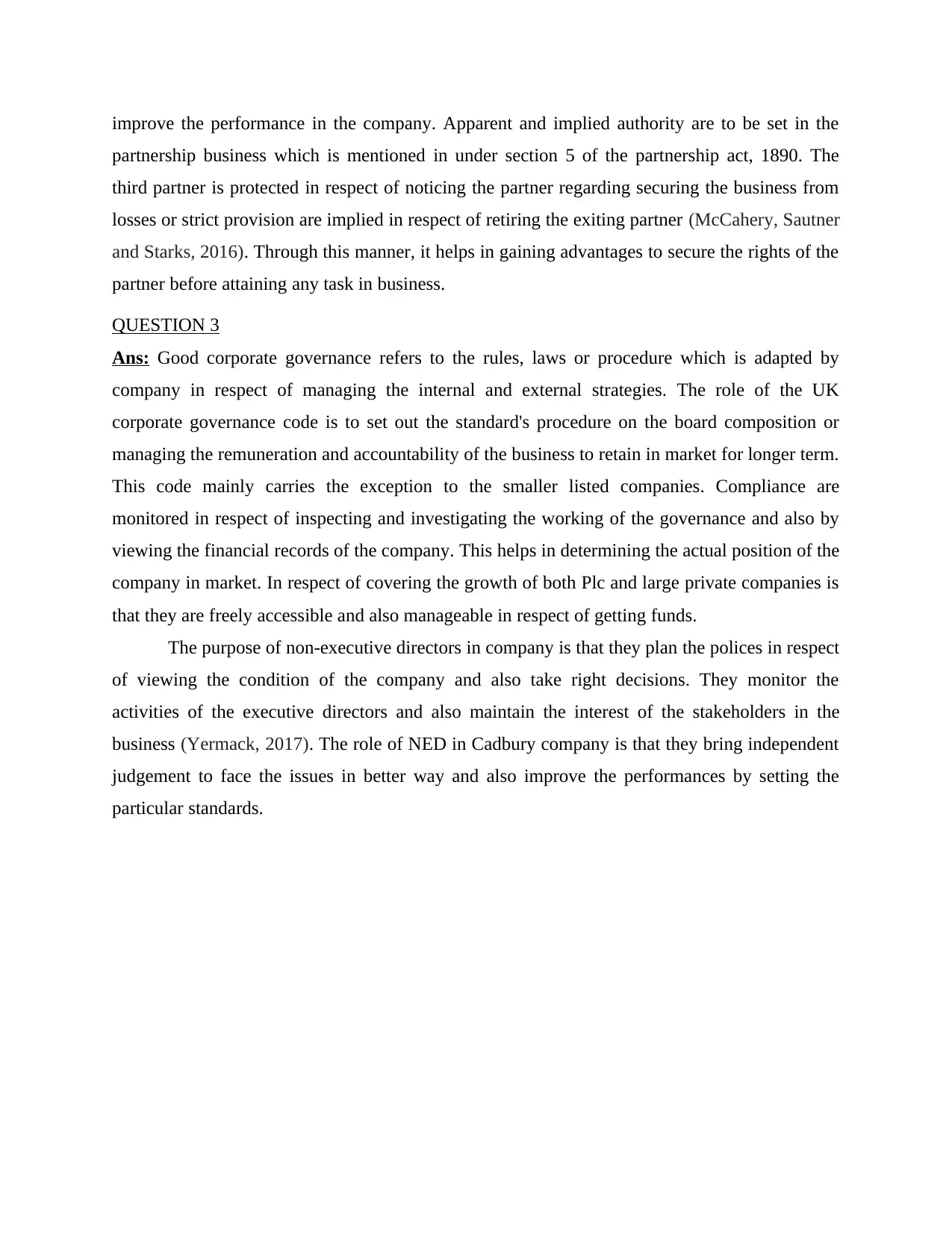
improve the performance in the company. Apparent and implied authority are to be set in the
partnership business which is mentioned in under section 5 of the partnership act, 1890. The
third partner is protected in respect of noticing the partner regarding securing the business from
losses or strict provision are implied in respect of retiring the exiting partner (McCahery, Sautner
and Starks, 2016). Through this manner, it helps in gaining advantages to secure the rights of the
partner before attaining any task in business.
QUESTION 3
Ans: Good corporate governance refers to the rules, laws or procedure which is adapted by
company in respect of managing the internal and external strategies. The role of the UK
corporate governance code is to set out the standard's procedure on the board composition or
managing the remuneration and accountability of the business to retain in market for longer term.
This code mainly carries the exception to the smaller listed companies. Compliance are
monitored in respect of inspecting and investigating the working of the governance and also by
viewing the financial records of the company. This helps in determining the actual position of the
company in market. In respect of covering the growth of both Plc and large private companies is
that they are freely accessible and also manageable in respect of getting funds.
The purpose of non-executive directors in company is that they plan the polices in respect
of viewing the condition of the company and also take right decisions. They monitor the
activities of the executive directors and also maintain the interest of the stakeholders in the
business (Yermack, 2017). The role of NED in Cadbury company is that they bring independent
judgement to face the issues in better way and also improve the performances by setting the
particular standards.
partnership business which is mentioned in under section 5 of the partnership act, 1890. The
third partner is protected in respect of noticing the partner regarding securing the business from
losses or strict provision are implied in respect of retiring the exiting partner (McCahery, Sautner
and Starks, 2016). Through this manner, it helps in gaining advantages to secure the rights of the
partner before attaining any task in business.
QUESTION 3
Ans: Good corporate governance refers to the rules, laws or procedure which is adapted by
company in respect of managing the internal and external strategies. The role of the UK
corporate governance code is to set out the standard's procedure on the board composition or
managing the remuneration and accountability of the business to retain in market for longer term.
This code mainly carries the exception to the smaller listed companies. Compliance are
monitored in respect of inspecting and investigating the working of the governance and also by
viewing the financial records of the company. This helps in determining the actual position of the
company in market. In respect of covering the growth of both Plc and large private companies is
that they are freely accessible and also manageable in respect of getting funds.
The purpose of non-executive directors in company is that they plan the polices in respect
of viewing the condition of the company and also take right decisions. They monitor the
activities of the executive directors and also maintain the interest of the stakeholders in the
business (Yermack, 2017). The role of NED in Cadbury company is that they bring independent
judgement to face the issues in better way and also improve the performances by setting the
particular standards.
⊘ This is a preview!⊘
Do you want full access?
Subscribe today to unlock all pages.

Trusted by 1+ million students worldwide
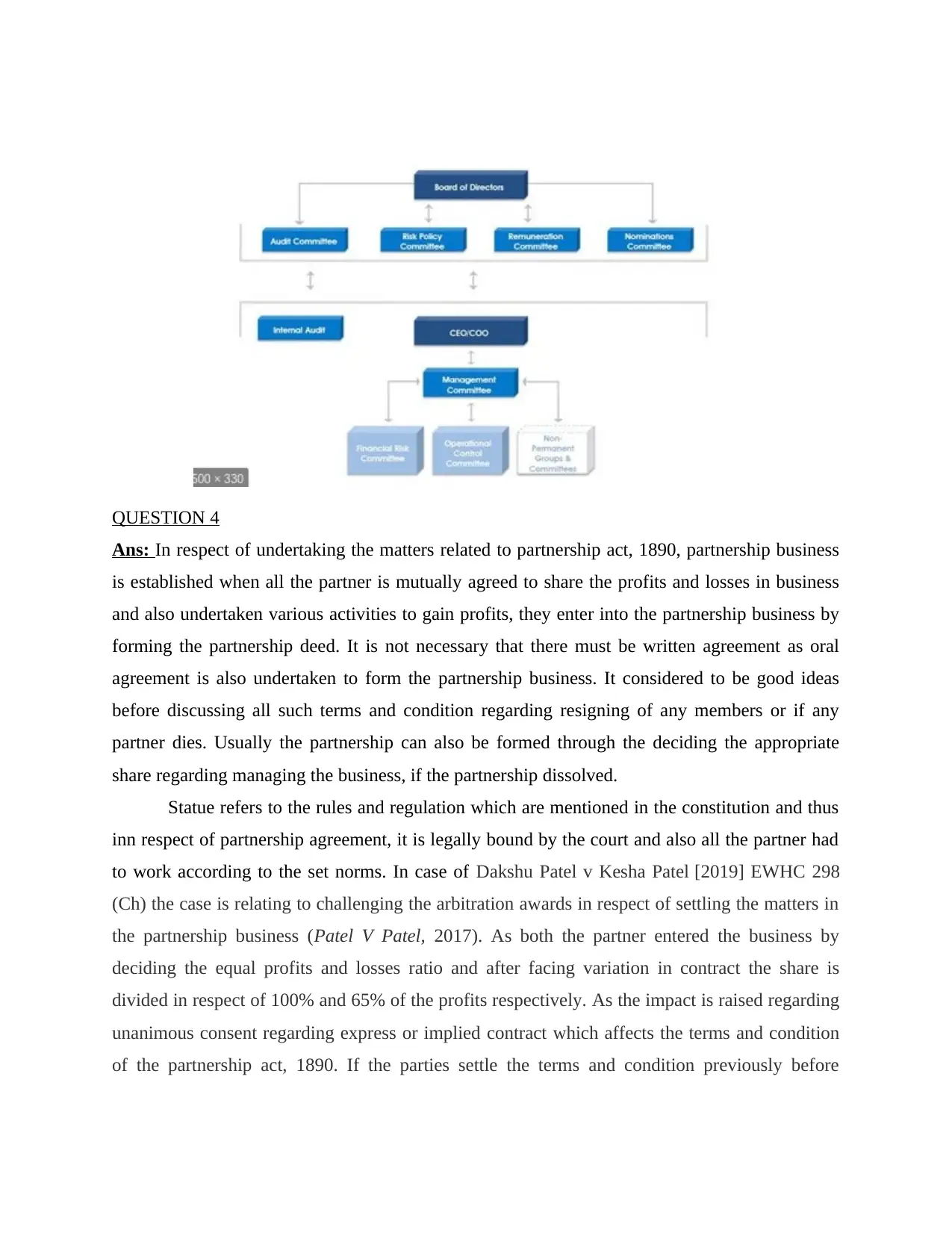
QUESTION 4
Ans: In respect of undertaking the matters related to partnership act, 1890, partnership business
is established when all the partner is mutually agreed to share the profits and losses in business
and also undertaken various activities to gain profits, they enter into the partnership business by
forming the partnership deed. It is not necessary that there must be written agreement as oral
agreement is also undertaken to form the partnership business. It considered to be good ideas
before discussing all such terms and condition regarding resigning of any members or if any
partner dies. Usually the partnership can also be formed through the deciding the appropriate
share regarding managing the business, if the partnership dissolved.
Statue refers to the rules and regulation which are mentioned in the constitution and thus
inn respect of partnership agreement, it is legally bound by the court and also all the partner had
to work according to the set norms. In case of Dakshu Patel v Kesha Patel [2019] EWHC 298
(Ch) the case is relating to challenging the arbitration awards in respect of settling the matters in
the partnership business (Patel V Patel, 2017). As both the partner entered the business by
deciding the equal profits and losses ratio and after facing variation in contract the share is
divided in respect of 100% and 65% of the profits respectively. As the impact is raised regarding
unanimous consent regarding express or implied contract which affects the terms and condition
of the partnership act, 1890. If the parties settle the terms and condition previously before
Ans: In respect of undertaking the matters related to partnership act, 1890, partnership business
is established when all the partner is mutually agreed to share the profits and losses in business
and also undertaken various activities to gain profits, they enter into the partnership business by
forming the partnership deed. It is not necessary that there must be written agreement as oral
agreement is also undertaken to form the partnership business. It considered to be good ideas
before discussing all such terms and condition regarding resigning of any members or if any
partner dies. Usually the partnership can also be formed through the deciding the appropriate
share regarding managing the business, if the partnership dissolved.
Statue refers to the rules and regulation which are mentioned in the constitution and thus
inn respect of partnership agreement, it is legally bound by the court and also all the partner had
to work according to the set norms. In case of Dakshu Patel v Kesha Patel [2019] EWHC 298
(Ch) the case is relating to challenging the arbitration awards in respect of settling the matters in
the partnership business (Patel V Patel, 2017). As both the partner entered the business by
deciding the equal profits and losses ratio and after facing variation in contract the share is
divided in respect of 100% and 65% of the profits respectively. As the impact is raised regarding
unanimous consent regarding express or implied contract which affects the terms and condition
of the partnership act, 1890. If the parties settle the terms and condition previously before
Paraphrase This Document
Need a fresh take? Get an instant paraphrase of this document with our AI Paraphraser

entering into the partnership agreement, they can resolve the matters easily (Dimopoulos and
Wagner, 2016).
Wagner, 2016).
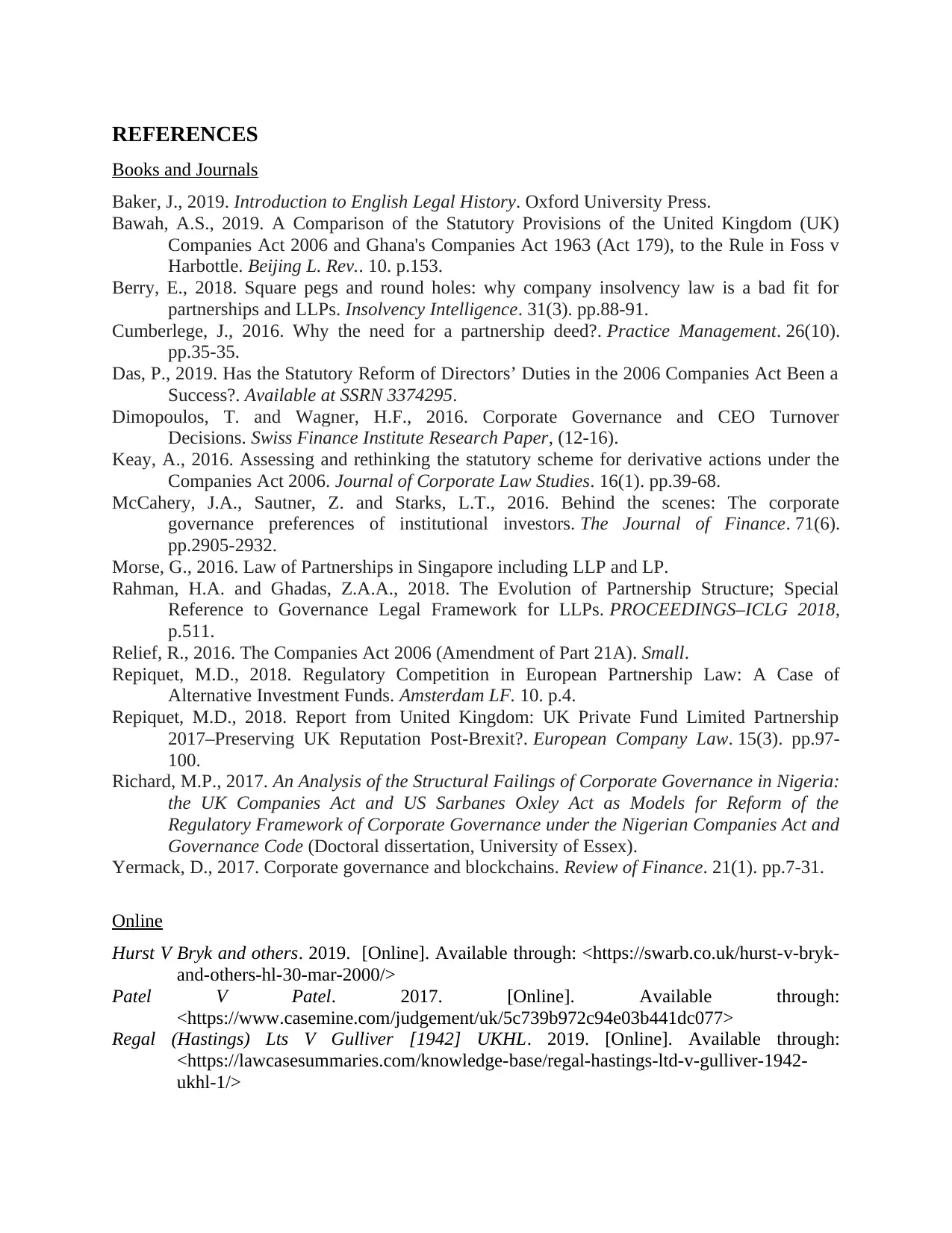
REFERENCES
Books and Journals
Baker, J., 2019. Introduction to English Legal History. Oxford University Press.
Bawah, A.S., 2019. A Comparison of the Statutory Provisions of the United Kingdom (UK)
Companies Act 2006 and Ghana's Companies Act 1963 (Act 179), to the Rule in Foss v
Harbottle. Beijing L. Rev.. 10. p.153.
Berry, E., 2018. Square pegs and round holes: why company insolvency law is a bad fit for
partnerships and LLPs. Insolvency Intelligence. 31(3). pp.88-91.
Cumberlege, J., 2016. Why the need for a partnership deed?. Practice Management. 26(10).
pp.35-35.
Das, P., 2019. Has the Statutory Reform of Directors’ Duties in the 2006 Companies Act Been a
Success?. Available at SSRN 3374295.
Dimopoulos, T. and Wagner, H.F., 2016. Corporate Governance and CEO Turnover
Decisions. Swiss Finance Institute Research Paper, (12-16).
Keay, A., 2016. Assessing and rethinking the statutory scheme for derivative actions under the
Companies Act 2006. Journal of Corporate Law Studies. 16(1). pp.39-68.
McCahery, J.A., Sautner, Z. and Starks, L.T., 2016. Behind the scenes: The corporate
governance preferences of institutional investors. The Journal of Finance. 71(6).
pp.2905-2932.
Morse, G., 2016. Law of Partnerships in Singapore including LLP and LP.
Rahman, H.A. and Ghadas, Z.A.A., 2018. The Evolution of Partnership Structure; Special
Reference to Governance Legal Framework for LLPs. PROCEEDINGS–ICLG 2018,
p.511.
Relief, R., 2016. The Companies Act 2006 (Amendment of Part 21A). Small.
Repiquet, M.D., 2018. Regulatory Competition in European Partnership Law: A Case of
Alternative Investment Funds. Amsterdam LF. 10. p.4.
Repiquet, M.D., 2018. Report from United Kingdom: UK Private Fund Limited Partnership
2017–Preserving UK Reputation Post-Brexit?. European Company Law. 15(3). pp.97-
100.
Richard, M.P., 2017. An Analysis of the Structural Failings of Corporate Governance in Nigeria:
the UK Companies Act and US Sarbanes Oxley Act as Models for Reform of the
Regulatory Framework of Corporate Governance under the Nigerian Companies Act and
Governance Code (Doctoral dissertation, University of Essex).
Yermack, D., 2017. Corporate governance and blockchains. Review of Finance. 21(1). pp.7-31.
Online
Hurst V Bryk and others. 2019. [Online]. Available through: <https://swarb.co.uk/hurst-v-bryk-
and-others-hl-30-mar-2000/>
Patel V Patel. 2017. [Online]. Available through:
<https://www.casemine.com/judgement/uk/5c739b972c94e03b441dc077>
Regal (Hastings) Lts V Gulliver [1942] UKHL. 2019. [Online]. Available through:
<https://lawcasesummaries.com/knowledge-base/regal-hastings-ltd-v-gulliver-1942-
ukhl-1/>
Books and Journals
Baker, J., 2019. Introduction to English Legal History. Oxford University Press.
Bawah, A.S., 2019. A Comparison of the Statutory Provisions of the United Kingdom (UK)
Companies Act 2006 and Ghana's Companies Act 1963 (Act 179), to the Rule in Foss v
Harbottle. Beijing L. Rev.. 10. p.153.
Berry, E., 2018. Square pegs and round holes: why company insolvency law is a bad fit for
partnerships and LLPs. Insolvency Intelligence. 31(3). pp.88-91.
Cumberlege, J., 2016. Why the need for a partnership deed?. Practice Management. 26(10).
pp.35-35.
Das, P., 2019. Has the Statutory Reform of Directors’ Duties in the 2006 Companies Act Been a
Success?. Available at SSRN 3374295.
Dimopoulos, T. and Wagner, H.F., 2016. Corporate Governance and CEO Turnover
Decisions. Swiss Finance Institute Research Paper, (12-16).
Keay, A., 2016. Assessing and rethinking the statutory scheme for derivative actions under the
Companies Act 2006. Journal of Corporate Law Studies. 16(1). pp.39-68.
McCahery, J.A., Sautner, Z. and Starks, L.T., 2016. Behind the scenes: The corporate
governance preferences of institutional investors. The Journal of Finance. 71(6).
pp.2905-2932.
Morse, G., 2016. Law of Partnerships in Singapore including LLP and LP.
Rahman, H.A. and Ghadas, Z.A.A., 2018. The Evolution of Partnership Structure; Special
Reference to Governance Legal Framework for LLPs. PROCEEDINGS–ICLG 2018,
p.511.
Relief, R., 2016. The Companies Act 2006 (Amendment of Part 21A). Small.
Repiquet, M.D., 2018. Regulatory Competition in European Partnership Law: A Case of
Alternative Investment Funds. Amsterdam LF. 10. p.4.
Repiquet, M.D., 2018. Report from United Kingdom: UK Private Fund Limited Partnership
2017–Preserving UK Reputation Post-Brexit?. European Company Law. 15(3). pp.97-
100.
Richard, M.P., 2017. An Analysis of the Structural Failings of Corporate Governance in Nigeria:
the UK Companies Act and US Sarbanes Oxley Act as Models for Reform of the
Regulatory Framework of Corporate Governance under the Nigerian Companies Act and
Governance Code (Doctoral dissertation, University of Essex).
Yermack, D., 2017. Corporate governance and blockchains. Review of Finance. 21(1). pp.7-31.
Online
Hurst V Bryk and others. 2019. [Online]. Available through: <https://swarb.co.uk/hurst-v-bryk-
and-others-hl-30-mar-2000/>
Patel V Patel. 2017. [Online]. Available through:
<https://www.casemine.com/judgement/uk/5c739b972c94e03b441dc077>
Regal (Hastings) Lts V Gulliver [1942] UKHL. 2019. [Online]. Available through:
<https://lawcasesummaries.com/knowledge-base/regal-hastings-ltd-v-gulliver-1942-
ukhl-1/>
⊘ This is a preview!⊘
Do you want full access?
Subscribe today to unlock all pages.

Trusted by 1+ million students worldwide
1 out of 12
Related Documents
Your All-in-One AI-Powered Toolkit for Academic Success.
+13062052269
info@desklib.com
Available 24*7 on WhatsApp / Email
![[object Object]](/_next/static/media/star-bottom.7253800d.svg)
Unlock your academic potential
Copyright © 2020–2026 A2Z Services. All Rights Reserved. Developed and managed by ZUCOL.





